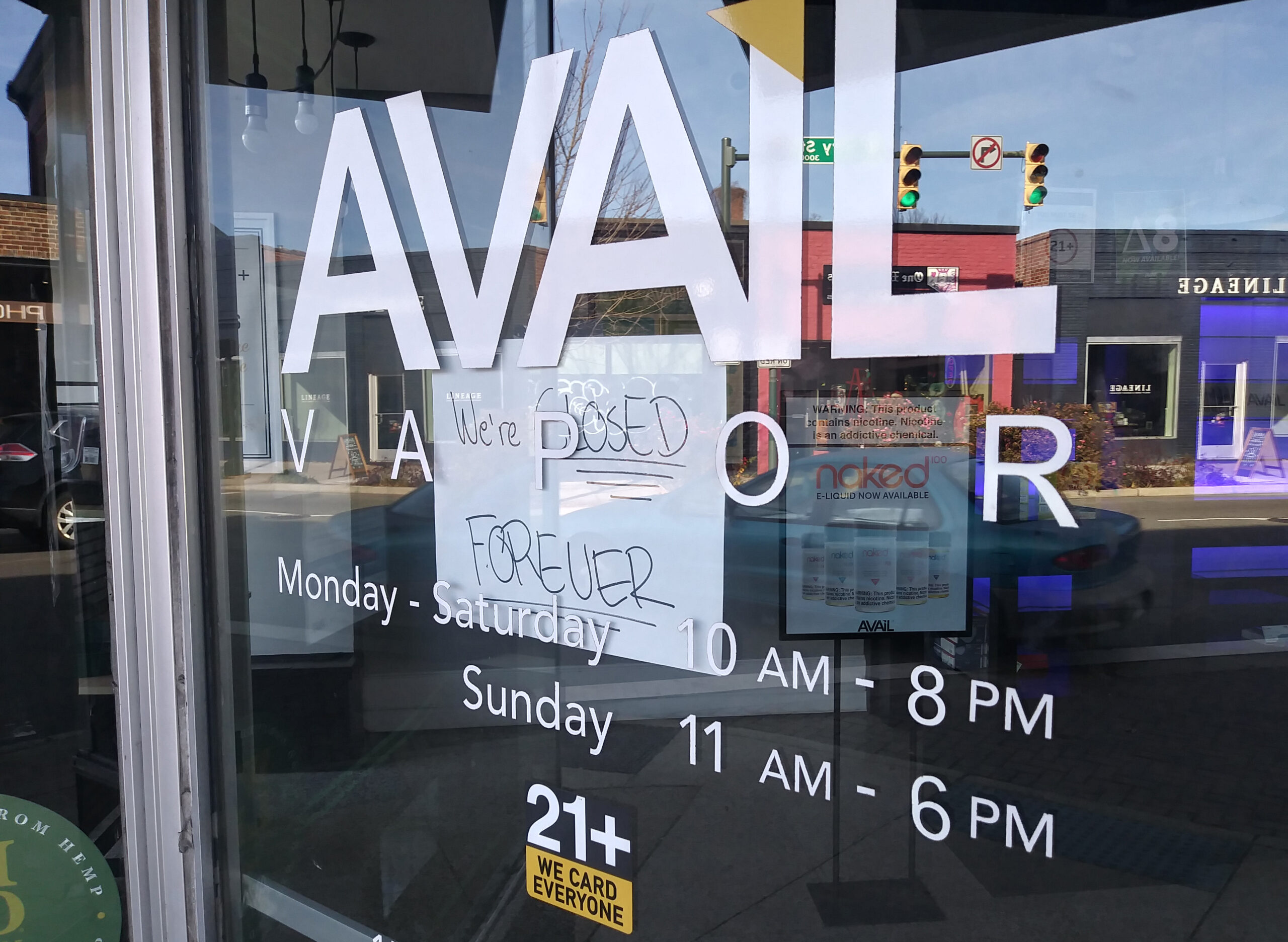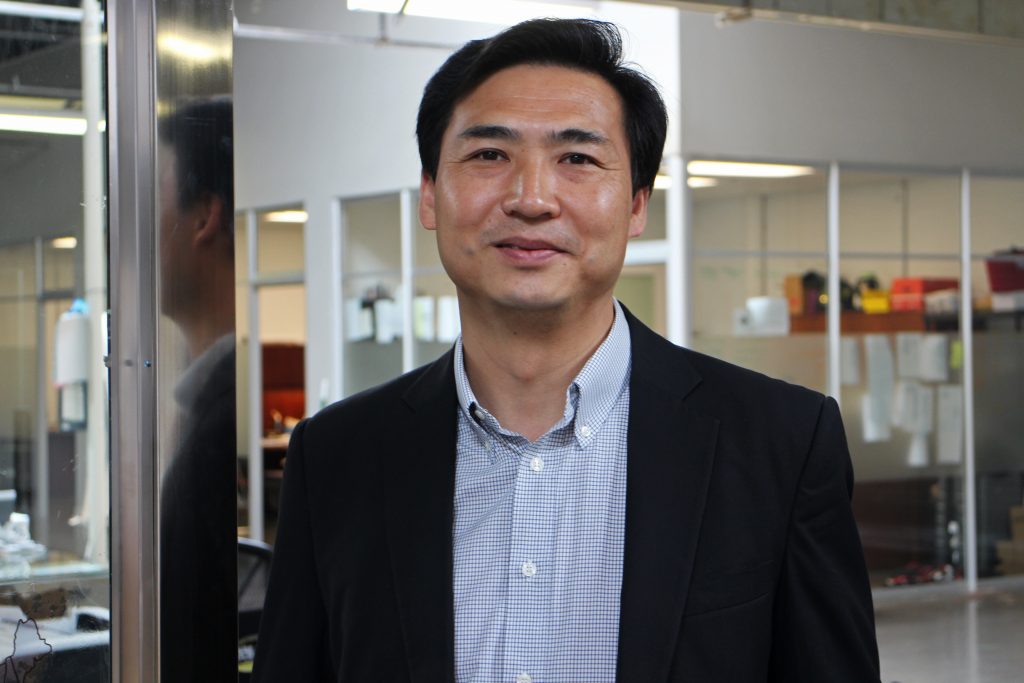
Avail Vapor’s former Carytown location, which was among the last of the e-cigarette retailer’s stores, was permanently closed by October 2021. (BizSense file)
Two years after it ceased operations in the face of an unfavorable FDA decision, Richmond-based Avail Vapor – or at least what’s left of it – is renewing a legal battle to right what its founder sees as a regulatory wrong.
The remnants of the local e-cigarette company last week filed a request for the U.S. Supreme Court to review a lower court’s ruling against an appeal Avail had filed following the FDA’s denial of the company’s application to continue to sell its vaping products.
Avail was founded locally in 2013, and grew quickly during a time of scant vaping regulations. At its peak, the company manufactured its own e-cig devices and e-cig liquids, while also opening nearly 100 of its own vape shops in a dozen states.
But it completed a full draw down of its brick-and-mortar business in late 2021, owing to the FDA’s decision to reject its application to continue to sell its nicotine-containing e-liquids. Avail founder and CEO James Xu said the company’s FDA application was rejected because it lacked data that Avail initially understood to be optional but that the FDA later deemed essential, which happened in the wake of the filing of the application.
That after-the-fact change is what’s fueling the company’s latest legal efforts to take its case to the highest court in the land.
“The fundamental thing is we truly believe the FDA shifted their goalposts after we submitted our application,” Xu said in an interview last week.
In its filing with the Supreme Court, Avail argues that because the criteria by which its application would be judged was changed late in the process and without a chance to address the omission, the FDA’s ruling was out of sync with legal standards regarding how regulatory agencies make determinations.
“The notice that FDA, or any agency, must provide to regulated stakeholders when the agency changes policy is central to Avail’s case,” the court filing states. “Here, FDA provided no timely notice of its … changes to the evidentiary standard and studies it would accept. As a result, Avail received a marketing denial order (‘MDO’) premised on new, post hoc evidentiary requirements that Avail had no fair opportunity to meet.”
In 2016, the FDA issued new compliance standards for vaping, and companies were directed to file applications for marketing approval to continue to sell vape products. Avail was subject to the rules because it manufactured its own e-liquid products.
Avail submitted its application in September 2020, and Xu said more than $10 million was spent to do testing and prepare its application. The FDA rejected the application in September 2021.
“Petitioners submitted premarket applications that followed closely the instructions for supporting evidence FDA provided in public meetings, a guidance document, and a proposed rule,” the latest court filing read. “FDA denied Petitioners’ applications for non-tobacco-flavored (electronic cigarette) products based on a new, previously unannounced evidentiary standard requiring data from studies comparing the flavored products to tobacco-flavored (electronic cigarette) products in terms of their efficacy at promoting adult smokers’ switching or cigarette reduction over time.”
“(The FDA) adopted this new evidentiary standard without notice or warning, and only disclosed it when the agency issued the first of hundreds of orders denying marketing authorization for some 99% of all timely filed applications for (electronic cigarette) products.”
The FDA didn’t respond to a request for comment.
Avail’s legal battle isn’t necessarily an attempt at a comeback for the business. Xu said it would be difficult for Avail to rebuild its business today, amid FDA regulations and what he characterized as a market awash in illegal vaping products.
“Even if we win the case, the FDA has to enforce the market. If they don’t enforce the market, you’re not playing on a level field. All the illegal products, they don’t play by the rules,” Xu said. “At this point, in our opinion, the whole market is ruined by the FDA and it’s always going to be the illegal market running things.”
In its most recent filing, Avail is asking the Supreme Court to issue a writ of certiorari, which would order the U.S. Court of Appeals for the Fourth Circuit, where Avail’s appeal of the FDA decision failed in December 2022, to provide case records for the Supreme Court’s review. Afterward, the Supreme Court could decide to take up the case itself.
The Supreme Court could make a decision on whether to hear the case in the fall, according to Eric Heyer of the D.C. office of law firm Thompson Hine, which is representing Avail.

Avail Vapor’s former Carytown location, which was among the last of the e-cigarette retailer’s stores, was permanently closed by October 2021. (BizSense file)
Two years after it ceased operations in the face of an unfavorable FDA decision, Richmond-based Avail Vapor – or at least what’s left of it – is renewing a legal battle to right what its founder sees as a regulatory wrong.
The remnants of the local e-cigarette company last week filed a request for the U.S. Supreme Court to review a lower court’s ruling against an appeal Avail had filed following the FDA’s denial of the company’s application to continue to sell its vaping products.
Avail was founded locally in 2013, and grew quickly during a time of scant vaping regulations. At its peak, the company manufactured its own e-cig devices and e-cig liquids, while also opening nearly 100 of its own vape shops in a dozen states.
But it completed a full draw down of its brick-and-mortar business in late 2021, owing to the FDA’s decision to reject its application to continue to sell its nicotine-containing e-liquids. Avail founder and CEO James Xu said the company’s FDA application was rejected because it lacked data that Avail initially understood to be optional but that the FDA later deemed essential, which happened in the wake of the filing of the application.
That after-the-fact change is what’s fueling the company’s latest legal efforts to take its case to the highest court in the land.
“The fundamental thing is we truly believe the FDA shifted their goalposts after we submitted our application,” Xu said in an interview last week.
In its filing with the Supreme Court, Avail argues that because the criteria by which its application would be judged was changed late in the process and without a chance to address the omission, the FDA’s ruling was out of sync with legal standards regarding how regulatory agencies make determinations.
“The notice that FDA, or any agency, must provide to regulated stakeholders when the agency changes policy is central to Avail’s case,” the court filing states. “Here, FDA provided no timely notice of its … changes to the evidentiary standard and studies it would accept. As a result, Avail received a marketing denial order (‘MDO’) premised on new, post hoc evidentiary requirements that Avail had no fair opportunity to meet.”
In 2016, the FDA issued new compliance standards for vaping, and companies were directed to file applications for marketing approval to continue to sell vape products. Avail was subject to the rules because it manufactured its own e-liquid products.
Avail submitted its application in September 2020, and Xu said more than $10 million was spent to do testing and prepare its application. The FDA rejected the application in September 2021.
“Petitioners submitted premarket applications that followed closely the instructions for supporting evidence FDA provided in public meetings, a guidance document, and a proposed rule,” the latest court filing read. “FDA denied Petitioners’ applications for non-tobacco-flavored (electronic cigarette) products based on a new, previously unannounced evidentiary standard requiring data from studies comparing the flavored products to tobacco-flavored (electronic cigarette) products in terms of their efficacy at promoting adult smokers’ switching or cigarette reduction over time.”
“(The FDA) adopted this new evidentiary standard without notice or warning, and only disclosed it when the agency issued the first of hundreds of orders denying marketing authorization for some 99% of all timely filed applications for (electronic cigarette) products.”
The FDA didn’t respond to a request for comment.
Avail’s legal battle isn’t necessarily an attempt at a comeback for the business. Xu said it would be difficult for Avail to rebuild its business today, amid FDA regulations and what he characterized as a market awash in illegal vaping products.
“Even if we win the case, the FDA has to enforce the market. If they don’t enforce the market, you’re not playing on a level field. All the illegal products, they don’t play by the rules,” Xu said. “At this point, in our opinion, the whole market is ruined by the FDA and it’s always going to be the illegal market running things.”
In its most recent filing, Avail is asking the Supreme Court to issue a writ of certiorari, which would order the U.S. Court of Appeals for the Fourth Circuit, where Avail’s appeal of the FDA decision failed in December 2022, to provide case records for the Supreme Court’s review. Afterward, the Supreme Court could decide to take up the case itself.
The Supreme Court could make a decision on whether to hear the case in the fall, according to Eric Heyer of the D.C. office of law firm Thompson Hine, which is representing Avail.
